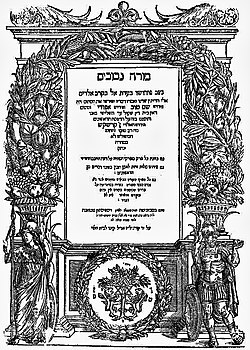A request that this article title be changed to Moses of Narbonne is under discussion . Please do not move this article until the discussion is closed. |
| Part of a series on |
| Jewish philosophy |
|---|
 |
Moses ben Joshua of Narbonne, also known as Moses of Narbonne, mestre Vidal Bellshom, maestro Vidal Blasom, and Moses Narboni, was a medieval Jewish philosopher and physician born in Perpignan in the Kingdom of Majorca at the end of the thirteenth century. He died sometime after 1362. [1] He began studying philosophy with his father when he was thirteen and then studied with Moses and Abraham ben David Caslari. He studied medicine and eventually became a successful physician, and was well versed in Biblical and rabbinic literature.
Eventually, he traveled to the Crown of Aragon, where he is known to have lived and studied in Cervera (1348–1349). During the an outbreak of the Black Death, when persecution of Jews was widespread, ben Joshua was forced to flee when an angry mob attacked the Jewish community there. He subsequently lived in Barcelona, where he wrote a commentary on the medieval philosophical tale Hayy ibn Yaqdhan , in which he called to appropriate autodidacticism as a pedagogical program. [2] He also lived in Valencia. He also lived in the Kingdom of Castile in Toledo, Burgos and Soria (1358–1362). In 1362, he returned to Perpignan and died there.
Moses was an admirer of Averroes; he devoted a great deal of study to his works and wrote commentaries on several of them. Perhaps Narboni's best-known work is his Treatise on the Perfection of the Soul.
He believed that Judaism was a guide to the highest degree of theoretical and moral truth. In common with others of his era he believed that the Torah had both a simple, direct meaning accessible to the average reader as well as a deeper, metaphysical meaning accessible to thinkers. He rejected the belief in miracles, instead believing they could be explained, and defended man's free will by philosophical arguments. Because of these and other beliefs, he was not accepted by many in the rabbinical Jewish community for fear of his figurative membership in the school of extreme rationalism which gave rise to questions of his legitimacy as an authority on Jewish law, custom and philosophy. [3]